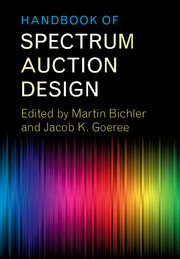Book contents
- Frontmatter
- Contents
- List of Contributors
- Preface
- List of Papers
- Part I The Simultaneous Multiple-Round Auction
- Part II The Combinatorial Clock Auction Designs
- 5 Combinatorial Auction Design
- 6 The Clock-Proxy Auction: A Practical Combinatorial Auction Design
- 7 Spectrum Auction Design
- 8 A Practical Guide to the Combinatorial Clock Auction
- 9 Market Design and the Evolution of the Combinatorial Clock Auction
- 10 Quadratic Core-Selecting Payment Rules for Combinatorial Auctions
- 11 Core-Selecting Package Auctions
- 12 A New Payment Rule for Core-Selecting Package Auctions
- 13 On the Impossibility of Core-Selecting Auctions
- 14 Ascending Combinatorial Auctions with Risk Averse Bidders
- 15 Properties of the Combinatorial Clock Auction
- 16 Budget Constraints in Combinatorial Clock Auctions
- 17 (Un)expected Bidder Behavior in Spectrum Auctions: About Inconsistent Bidding and its Impact on Efficiency in the Combinatorial Clock Auction
- Part III Alternative Auction Designs
- Part IV Experimental Comparisons of Auction Designs
- Part V The Bidders’ Perspective
- Part VI Secondary Markets and Exchanges
- Outlook
- References
12 - A New Payment Rule for Core-Selecting Package Auctions
from Part II - The Combinatorial Clock Auction Designs
Published online by Cambridge University Press: 26 October 2017
- Frontmatter
- Contents
- List of Contributors
- Preface
- List of Papers
- Part I The Simultaneous Multiple-Round Auction
- Part II The Combinatorial Clock Auction Designs
- 5 Combinatorial Auction Design
- 6 The Clock-Proxy Auction: A Practical Combinatorial Auction Design
- 7 Spectrum Auction Design
- 8 A Practical Guide to the Combinatorial Clock Auction
- 9 Market Design and the Evolution of the Combinatorial Clock Auction
- 10 Quadratic Core-Selecting Payment Rules for Combinatorial Auctions
- 11 Core-Selecting Package Auctions
- 12 A New Payment Rule for Core-Selecting Package Auctions
- 13 On the Impossibility of Core-Selecting Auctions
- 14 Ascending Combinatorial Auctions with Risk Averse Bidders
- 15 Properties of the Combinatorial Clock Auction
- 16 Budget Constraints in Combinatorial Clock Auctions
- 17 (Un)expected Bidder Behavior in Spectrum Auctions: About Inconsistent Bidding and its Impact on Efficiency in the Combinatorial Clock Auction
- Part III Alternative Auction Designs
- Part IV Experimental Comparisons of Auction Designs
- Part V The Bidders’ Perspective
- Part VI Secondary Markets and Exchanges
- Outlook
- References
Summary
Although the Combinatorial Clock Auction has been used in several spectrum auctions, the theoretical justification for the usual rule used to compute bidders’ payments is weak if “minimum revenue core” prices are not unique in the final (core-selecting package auction) stage. So this paper proposes an alternative way to compute bidders’ payments in that case. Specifically, we propose a new, easy-to-implement, class of payment rules: “Reference Rules”. In our simple model, Reference Rules give bidders lower marginal incentives to deviate from “truthful bidding” than the usual (“Vickrey-nearest”) payment rule, and are as robust as the usual rules to large deviations. (By contrast, small, almost-riskless, profitable deviations from “truthful bidding” are often easy for bidders to find under the usual rules.) Other considerations, including fairness and comprehensibility, also seem to support the use of Reference Rules. So although we take no position on the general merits, or otherwise, of Combinatorial Clock Auctions, we believe that using Reference Rules could improve their design.
Introduction
Day and Milgrom (2008) recently proposed a novel multi-object auction form – the “core-selecting package auction” – that seems sufficiently attractive, in particular in its handling of complementarities between objects, that it has already been adopted by regulators in several countries. The United States planned to use it for auctioning airport takeoff and landing slots, and the United Kingdom and other European countries have used it for auctioning radio spectrum.1 However Day and Milgrom's original work did not completely specify the auction's payment rules. This paper helps fill that gap.
A core-selecting auction takes sealed bids, identifies the “efficient” allocation (i.e., the allocation that would be value-maximising if all bids were actual values), and chooses associated payments so that the final (non-negative) payoffs are in the core (i.e., no set of bidders can join with the seller to form a “blocking coalition”). That is, a core-selecting auction allocates goods in the same way as a Vickrey-Clarke-Groves (henceforth, Vickrey) auction but substitutes core payments for Vickrey payments.
Information
- Type
- Chapter
- Information
- Handbook of Spectrum Auction Design , pp. 241 - 252Publisher: Cambridge University PressPrint publication year: 2017
